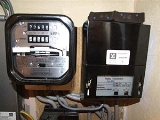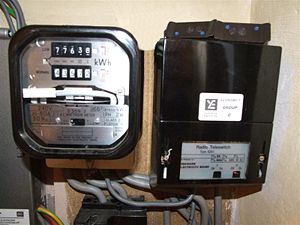
Economy 7
Encyclopedia
Economy 7 is the name of a differential tariff
provided by United Kingdom
electricity
suppliers that uses base load generation to provide cheap off-peak electricity during the night.
Houses using the Economy 7 tariff require a special electricity meter which provides two different readings - one for electricity used during the day, priced higher, and the other for the night, priced lower. The night (off-peak) period lasts for a total of seven hours, hence the name; however it may or may not be a continuous period, as it may alternate between the two prices during the night.
The first mention of Economy 7 is in 1978:
"A new off-peak tariff known as the 'Economy 7' tariff was introduced in October [1978].
It featured a seven-hour night rate some 20 per cent cheaper than most night-time tariffs, made
possible by economies in the night-time operation of the system."
In more recent years the difference between day and night rates has become much larger, with typically
over 50% reduction
(though dependent on the supplier). Choice of the Economy 7 tariff results in either or both of an
increased standing (fixed) charge or increased daytime rate.
 The night storage heater
The night storage heater
s and hot water boilers
are generally on a separate circuit which is only switched on when the night rate is activated, although any electrical appliance on an ordinary circuit during this period also runs at the lower rate of billing, such as a dishwasher
or washing machine
set to start using a timing device. Some such machines have timers built-in partly for this purpose, for example Bosch dishwashers.
In newer houses, a digital meter automatically switches to record both ranges. The wiring in the house is rarely different for Economy 7. Many consumers will however choose to set devices such as storage heaters and water heaters to turn on during the hours of Economy 7 to save money. Few houses now have devices controlled solely by the timer on the electricity meter itself.
The specific times when Economy 7 applies vary between different regions and at different times of year. Typically the seven-hour period starts at 1.30am during British Summer Time
and 12:30am during Greenwich Mean Time
(winter). Some regions use radio teleswitch
ing to control consumers' systems and vary the timing. This uses data superimposed on the 198 kHz BBC Radio 4
long-wave signal.
An Economy 7 tariff can end up costing significantly more than a standard tariff without restructuring current energy usage.
Differential tariff
Differential tariff is an example of demand side management where the price per unit of energy varies with time.-Background:There are several reasons why utilities manage demand through special programs. The utilities' reaction was the introduction of demand side management programs to overcome...
provided by United Kingdom
United Kingdom
The United Kingdom of Great Britain and Northern IrelandIn the United Kingdom and Dependencies, other languages have been officially recognised as legitimate autochthonous languages under the European Charter for Regional or Minority Languages...
electricity
Electricity
Electricity is a general term encompassing a variety of phenomena resulting from the presence and flow of electric charge. These include many easily recognizable phenomena, such as lightning, static electricity, and the flow of electrical current in an electrical wire...
suppliers that uses base load generation to provide cheap off-peak electricity during the night.
Houses using the Economy 7 tariff require a special electricity meter which provides two different readings - one for electricity used during the day, priced higher, and the other for the night, priced lower. The night (off-peak) period lasts for a total of seven hours, hence the name; however it may or may not be a continuous period, as it may alternate between the two prices during the night.
The first mention of Economy 7 is in 1978:
"A new off-peak tariff known as the 'Economy 7' tariff was introduced in October [1978].
It featured a seven-hour night rate some 20 per cent cheaper than most night-time tariffs, made
possible by economies in the night-time operation of the system."
In more recent years the difference between day and night rates has become much larger, with typically
over 50% reduction
(though dependent on the supplier). Choice of the Economy 7 tariff results in either or both of an
increased standing (fixed) charge or increased daytime rate.
Timing and switchover

Storage heater
A storage heater or heat bank is an electrical heater which stores thermal energy during the evening, or at night when base load electricity is available at lower cost, and releases the heat during the day as required.-Principle of operation:...
s and hot water boilers
Water heating
Water heating is a thermodynamic process using an energy source to heat water above its initial temperature. Typical domestic uses of hot water are for cooking, cleaning, bathing, and space heating...
are generally on a separate circuit which is only switched on when the night rate is activated, although any electrical appliance on an ordinary circuit during this period also runs at the lower rate of billing, such as a dishwasher
Dishwasher
A dishwasher is a mechanical device for cleaning dishes and eating utensils. Dishwashers can be found in restaurants and private homes.Unlike manual dishwashing, which relies largely on physical scrubbing to remove soiling, the mechanical dishwasher cleans by spraying hot water, typically between ...
or washing machine
Washing machine
A washing machine is a machine designed to wash laundry, such as clothing, towels and sheets...
set to start using a timing device. Some such machines have timers built-in partly for this purpose, for example Bosch dishwashers.
In newer houses, a digital meter automatically switches to record both ranges. The wiring in the house is rarely different for Economy 7. Many consumers will however choose to set devices such as storage heaters and water heaters to turn on during the hours of Economy 7 to save money. Few houses now have devices controlled solely by the timer on the electricity meter itself.
The specific times when Economy 7 applies vary between different regions and at different times of year. Typically the seven-hour period starts at 1.30am during British Summer Time
British Summer Time
Western European Summer Time is a summer daylight saving time scheme, 1 hour ahead of Coordinated Universal Time. It is used in the following places:* the Canary Islands* Portugal * Ireland...
and 12:30am during Greenwich Mean Time
Greenwich Mean Time
Greenwich Mean Time is a term originally referring to mean solar time at the Royal Observatory in Greenwich, London. It is arguably the same as Coordinated Universal Time and when this is viewed as a time zone the name Greenwich Mean Time is especially used by bodies connected with the United...
(winter). Some regions use radio teleswitch
Radio teleswitch
A Radio Teleswitch is a device used in the United Kingdom to allow electricity suppliers to switch large numbers of electricity meters between different tariffs, by broadcasting an embedded signal in broadcast radio signals...
ing to control consumers' systems and vary the timing. This uses data superimposed on the 198 kHz BBC Radio 4
BBC Radio 4
BBC Radio 4 is a British domestic radio station, operated and owned by the BBC, that broadcasts a wide variety of spoken-word programmes, including news, drama, comedy, science and history. It replaced the BBC Home Service in 1967. The station controller is currently Gwyneth Williams, and the...
long-wave signal.
Pricing
Electricity supply in the United Kingdom is deregulated and the several providers offer different tariffs, much as telephone or internet service providers do. Economy 7 can offer some consumers savings, as the rates during the 'night' period can be approximately half the price of a normal tariff. However, the price during the 'day' period may approach double. This means that a careful analysis should be done - if total power consumption remains constant before and after installation of an Economy 7 meter, if the price is double the normal tariff during the 'day' period, and half the normal during the 'night' period, then to break even the consumer would need to use over 2/3 of their energy during the 'night' period. (Typically this makes sense when heating/water is electric rather than gas).An Economy 7 tariff can end up costing significantly more than a standard tariff without restructuring current energy usage.
See also
- Economy 10Economy 10Economy 10 is the name of a tariff provided by United Kingdom electricity suppliers created in 2004. Similar to the Economy 7 this is designed to be used with high thermal mass heating such as storage heaters, underfloor heating, and is also used with electrical boilers driving radiators or...
- Energy use and conservation in the United KingdomEnergy use and conservation in the United KingdomEnergy use in the United Kingdom stood at 3,894.6 kilogrammes of oil equivalent per capita in 2005 compared to a world average of 1,778.0. In 2008, total energy consumed was 9.85 exajoules - around 2% of the estimated 474 EJ worldwide total...
- Load balancing (electrical power)Load balancing (electrical power)Load balancing refers to the use of various techniques by electrical power stations to store excess electrical power during low demand periods for release as demand rises....

